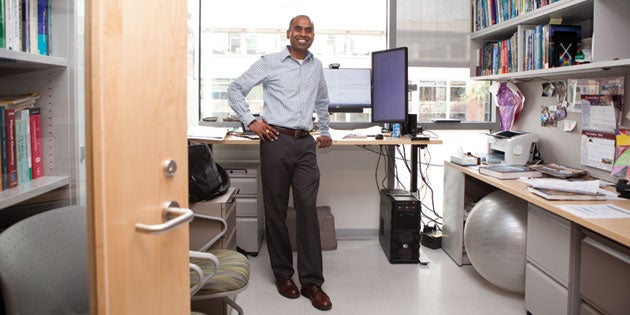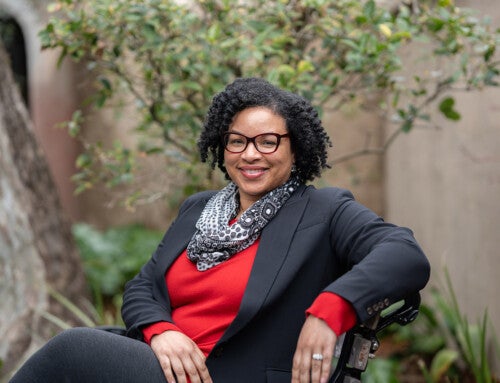People all over the College of Charleston campus are standing up for their health.

Karee White, assistant director for the Office of New Student Programs at the College of Charleston, uses a stand-up desk
With more and more awareness of the health risks of sitting too much — and more and more headlines like “Sitting Is the New Smoking” — stand-up desks are gaining converts everywhere, including at the College.
Proponents say eschewing chairs has helped sharpen their focus and improve their productivity at work, too.
Political science professor Chris Day ’95 began using a stand-up desk when a friend suggested it might help him recover from a back injury. “There’s a huge difference in health and productivity,” he says. “It’s made a measurable difference, and my life is better.”
Between work commutes, computer-based desk jobs and too much time on the couch, the average American is sedentary for several hours each day. Evaluating how much time she spent sitting throughout the day, Karee White, assistant director in the Office of New Student Programs, made the switch to a stand-up desk about a year ago.
“I try to live an active lifestyle, and the stand-up desk contributes to that,” White says. “I definitely feel much healthier standing.”
Vijay Vulava, associate professor of geology and environmental geosciences, began using a stand-up desk several years ago in an effort to alleviate back pain.
“I am very glad I made the change,” he says. “My productivity has also improved, not just because of less discomfort, but also because I can freely move about in my office while working or when meeting with students and colleagues.”
Andrew Bergstrom, director of Web strategies, has also found that using a stand-up desk helps promote teamwork with his colleagues.
“It allows me to move around my office without constantly getting up and down,” says Bergstrom. “It improves collaboration when meeting in my office as we move from the desktop to the dry erase board.”
Adjusting to a stand-up desk can take a few days or more, depending how much of the day a person spends doing desk work. Vulava suggests that those whose jobs are mostly confined to desk work will want to keep a chair handy for occasional breaks.
Another adjustment is the potential awkwardness of being the only person in your department using a stand-up desk. While skeptical co-workers might ask you if someone stole your chair – there’s something to be said for being a trendsetter.
Which is why more and more people are taking a stand.
This article originally appeared in the spring 2015 issue of the College of Charleston employee newsletter, Portico.





